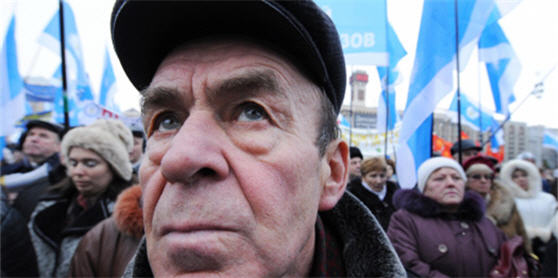 Russia has always had a knack for overshadowing its neighbors – and this time the West, focused on Moscow, is distracted from a crisis in Ukraine. As U.S. President Barack Obama gears up to “reset” Russia relations, Ukraine is in disarray. The country is teetering between economic collapse, Russian influence, and vague promises of Western support. It will take decisive moves from Washington to help pull Ukraine back from the edge. At the least, Obama should visit ailing Ukraine and prove that good relations with Russia don’t meant forgetting the rest of the region.
Russia has always had a knack for overshadowing its neighbors – and this time the West, focused on Moscow, is distracted from a crisis in Ukraine. As U.S. President Barack Obama gears up to “reset” Russia relations, Ukraine is in disarray. The country is teetering between economic collapse, Russian influence, and vague promises of Western support. It will take decisive moves from Washington to help pull Ukraine back from the edge. At the least, Obama should visit ailing Ukraine and prove that good relations with Russia don’t meant forgetting the rest of the region.
Economic decline is largely to blame for Ukraine’s perilous predicament. The country paid heavily for of its massive corporate foreign debt, failure to push through serious economic reform, and unwillingness to clean up a terribly corrupt energy sector. The International Monetary Fund and World Bank forecast an 8 to 9 percent drop in GDP this year, and that might be a conservative estimate; the economy has contracted some 30 percent in the first quarter alone. Ukraine’s currency, the hryvnya, has fallen 40 percent against the dollar. Unemployment may reach 10 percent and mass protests are not out of the question — especially in the troubled east.
Finger-pointing among Ukrainian politicians, already a national sport, will only accelerate as the country gears up for January 2010 elections for president (and possibly early parliamentary elections, too). Many, including Prime Minister Yulia Tymoshenko (who has been feuding with President Viktor Yushchenko since the Orange Revolution brought him to power in 2004) are calling for constitutional reform that would strengthen Ukraine’s parliament and weaken the presidency. Constitutional reform, important though that may be, is a divisive distraction at a horrible time. What would be more helpful is economic reform, as the IMF recommended as part of its $16.4 billion deal last year.
But politicians are desperate for quicker solutions, even ones that may not have Ukraine’s long-term interests in mind. Enter Moscow, which has provided loans to the tune of several billion dollars already to Kiev and is interested in buying up more Ukrainian properties and assets. Russia might not be acting out of mere kindness of heart; a campaign to regain its sphere of influence might be at work.
If so, it’s a campaign with strategic implications. Russia’s Black Sea fleet is set to operate in Ukraine’s port city of Sevastopol until 2017. In its current economic predicament, Ukraine will be in a weaker position in contentious negotiations with Moscow about whether to renew the arrangement. The same is true as the country rejects Russian nationalist claims that Crimea, internationally recognized as part of Ukraine, really belongs to Russia. Clashes between the two countries over gas delivery to Europe are also likely to continue — with Russia in a position to apply further pressure on Ukraine, (though Ukraine also needs to pay its bills so that future cutoffs are harder to justify).
Why should the international community be concerned about Ukraine’s fragility? In a word: location. The country of more than 46 million people is a strategically placed capitalist (albeit fragile) democracy on the fault line between Russia and the European Union. Messy and frustrating as Ukrainian politics may be, the country has been both peaceful and democratic since the Orange Revolution in 2004. The media in Ukraine are freer than ever, and the parliament (the Rada) is no rubber stamp for the executive branch — more than some of Ukraine’s neighbors can say. Ukraine is central to achieving the goal of a Europe that is whole, free, and at peace. It’s the right country in the right place. But if the West turns away, gains from the past five years could be lost.
Visible U.S. support for Ukraine is critical as the country struggles through the coming months. Obama should avoid boosting one politician over another prior to any elections. A visit to Kiev on the president’s scheduled trip to Moscow in July would help, sending a powerful message that America will not seek to improve relations with Russia at all costs, neighbors included. On his trip, Obama must make clear that he seeks better relations with Ukraine and other countries in the region even as he improves ties with Moscow. It’s a delicate balancing act, but neither policy can succeed without the other.
David J. Kramer is senior transatlantic fellow at the German Marshall Fund of the United States. He was assistant secretary of state for democracy, human rights and labor and a deputy assistant secretary responsible for Ukraine from 2005 to 2008. Damon Wilson is director of the international security program at the Atlantic Council. He served as special assistant to the president and senior director for European affairs at the National Security Council from 2007 to 2009. This essay was published at Foreign Policy’s The Argument blog.

